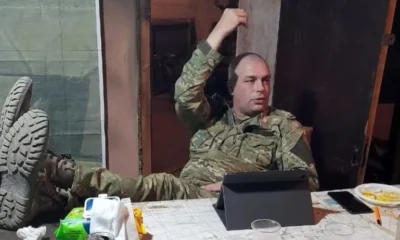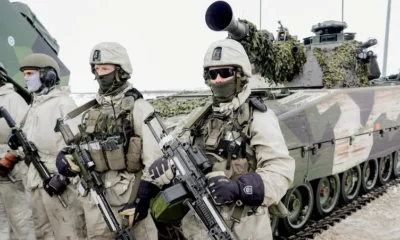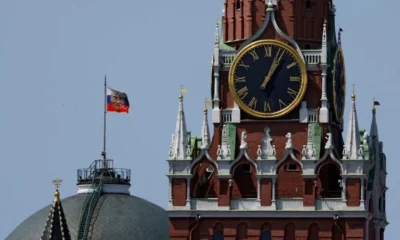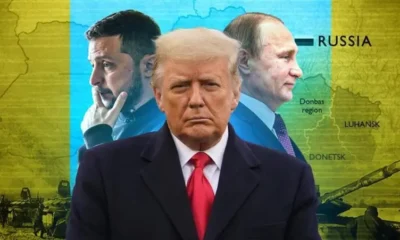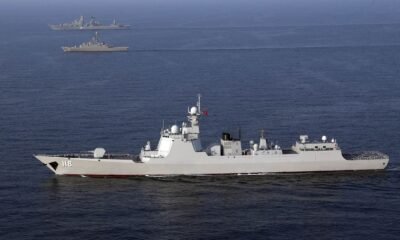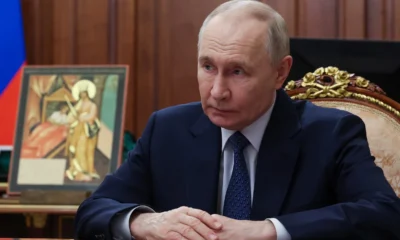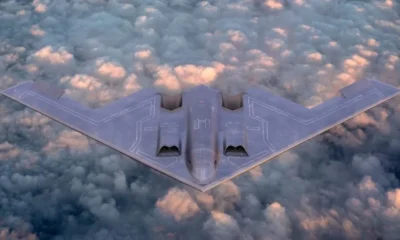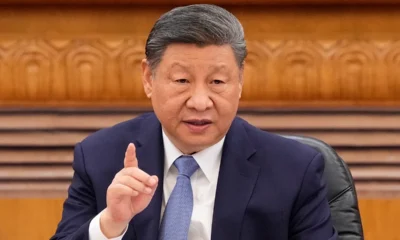Communication
Tucker Carlson Teases Volodymyr Zelensky Interview
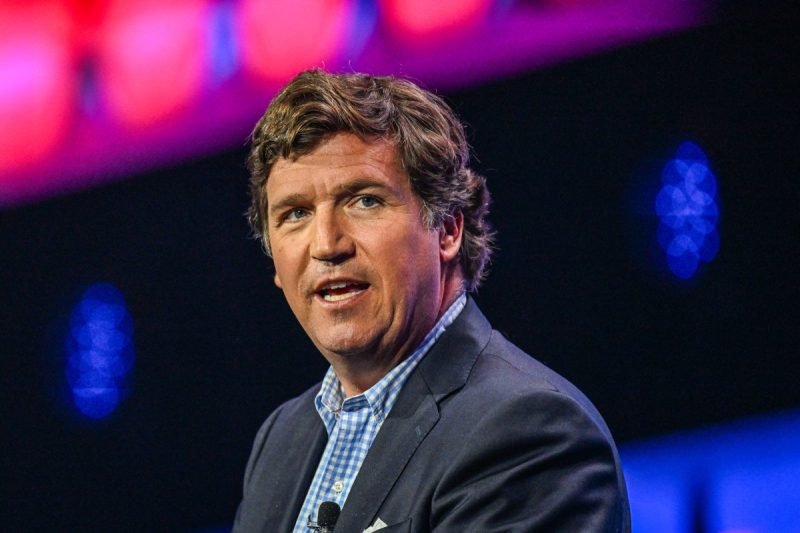
After Interviewing Putin, Carlson Pursues Conversation with Ukraine’s President
In a surprising move, conservative pundit Tucker Carlson hinted on Wednesday at a potential interview with Ukrainian President Volodymyr Zelensky. This revelation comes on the heels of Carlson’s February trip to Moscow, where he conducted a notable interview with Russian President Vladimir Putin, marking him as the first Western journalist to do so since the conflict began in February 2022.
“Looks like we’ve got the Zelensky interview. We’ve been trying for two years, and with particular intensity after interviewing Putin in February,” Carlson announced on X, formerly known as Twitter. This potential sit-down with Zelensky follows Carlson’s departure from Fox News last year, where he was known for his controversial takes, including his criticism of Zelensky and the Ukraine war, views that had garnered approval from Kremlin propagandists.
Carlson, who hosted “Tucker Carlson Tonight” from 2016 to 2023 before his sudden firing last April with no official explanation, stated his goal is to “bring Americans much-needed information about the conflict that’s completely reshaping their country’s position in the world.” The announcement of the possible interview with Zelensky has yet to elicit a response from Ukraine, and Newsweek has reached out to Ukraine’s Foreign Ministry and the Tucker Carlson Network for comment.
Following Carlson’s two-hour interview with Putin, the Russian president expressed his surprise over the lack of aggressive questioning. “To be honest, I thought that he would behave aggressively and ask so-called sharp questions. I was not just prepared for this, I wanted it, because it would give me the opportunity to respond in the same way,” Putin remarked to Russian journalist Pavel Aleksandrovich Zarubin on state television channel Russia-1. He added that he did not “feel full satisfaction from this interview.” Kremlin spokesperson Dmitry Peskov later stated that Putin agreed to the interview because Carlson’s perspective “differs” from other Western media.
Carlson’s announcement about the Zelensky interview received mixed reactions on social media. Ukrainian journalist Illia Ponomarenko endorsed the idea, saying on X, “I think Zelensky sitting down for an interview with Tucker is a good idea because there is no question Ukraine can’t give a fair answer to.” Ponomarenko further distinguished Zelensky’s candidacy for the interview by noting that, unlike Putin, Zelensky “has no need to crack freakishly weird mumbo-jumbo pseudo-historical freak Viking era theories to explain why Ukraine fights for survival in the largest European war of aggression since Hitler and why it is so important to help Ukraine win.”
However, skepticism abounds, with many voicing concerns about potential manipulation of the interview’s content. “Zelensky needs someone to video the whole interview because you can bet it will be a trap… they’ll change it and use for propaganda purposes,” one X user warned. Another echoed this sentiment, writing, “I’m more concerned about how they will doctor his answers in the final edit.”
Despite the buzz, Carlson has not provided a specific timeline for when this interview might occur, leaving followers in suspense with a tantalizing “Coming soon we hope.”
As the world watches and waits, Carlson’s potential interview with Zelensky promises to be another controversial chapter in the ongoing narrative of the Ukraine conflict. Whether it will bring new insights or further polarize opinions remains to be seen, but one thing is clear: the anticipation is building, and the stakes are high.
Communication
Gabon Suspends Facebook and TikTok
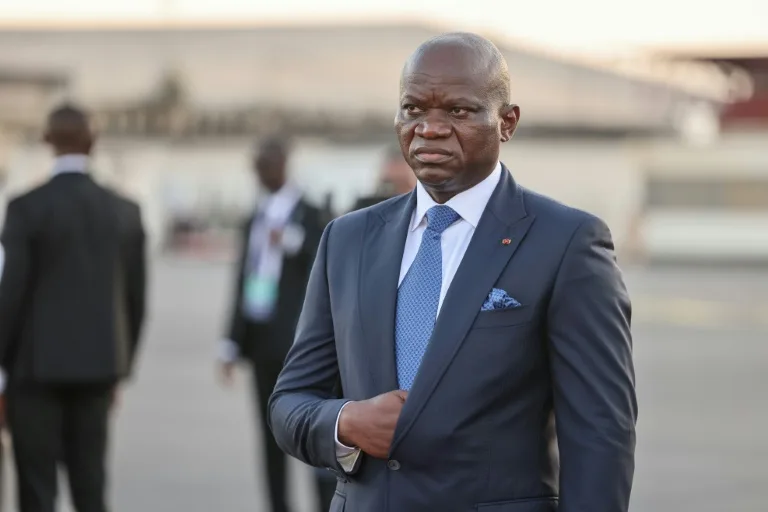
Strikes rise. Arrests follow. Now social media goes dark.
Gabon has suspended access to Facebook and TikTok following a surge of anti-government protests, regulators said, citing national security concerns and the spread of harmful online content.
AFP journalists in the capital confirmed Wednesday that both platforms were inaccessible, a day after the High Authority for Communication announced the “immediate suspension of social media platforms in Gabon until further notice.”
In a televised statement, the regulator’s spokesman, Jean-Claude Mendome, said online posts were fueling instability.
He pointed to what he described as “inappropriate, defamatory, hateful, and insulting content” that he said undermined public morality, social cohesion and the stability of state institutions.
He also cited the spread of false information, cyberbullying and the unauthorized disclosure of personal data.
While the regulator did not name specific platforms in its initial announcement, Facebook and TikTok were confirmed to be affected.
The authority said freedom of expression remains a constitutional right in Gabon, but argued that certain online activities risked triggering social conflict and destabilizing the country.
The suspension comes less than a year after President Brice Oligui Nguema was elected following a military-led transition. Oligui seized power in 2023 by ousting longtime leader Ali Bongo, whose family ruled Gabon for more than five decades. He won the April 2025 election by a wide margin, promising reforms and improved living standards.
Instead, his administration now faces mounting unrest. Teachers have been on strike since December, demanding better pay and working conditions after years of wage freezes that have eroded incomes amid rising living costs. Protests have since spread to other public sectors, including health, higher education and state broadcasting.
Opposition leader Alain-Claude Billie-By-Nze condemned the social media ban, calling it an attempt to impose “a climate of fear and repression.” In a Facebook post before the platform went offline, he urged civil society and citizens to resist what he described as an attack on fundamental freedoms.
Authorities last month arrested two prominent figures linked to the teachers’ movement, a move that critics say has heightened tensions and discouraged open discussion of the strikes.
With social media now restricted and public sector protests continuing, Gabon’s political climate appears increasingly strained — testing the reformist image President Oligui sought to project after his rise to power.
Communication
Russia Throttles Telegram as Kremlin Pushes State-Controlled Rival
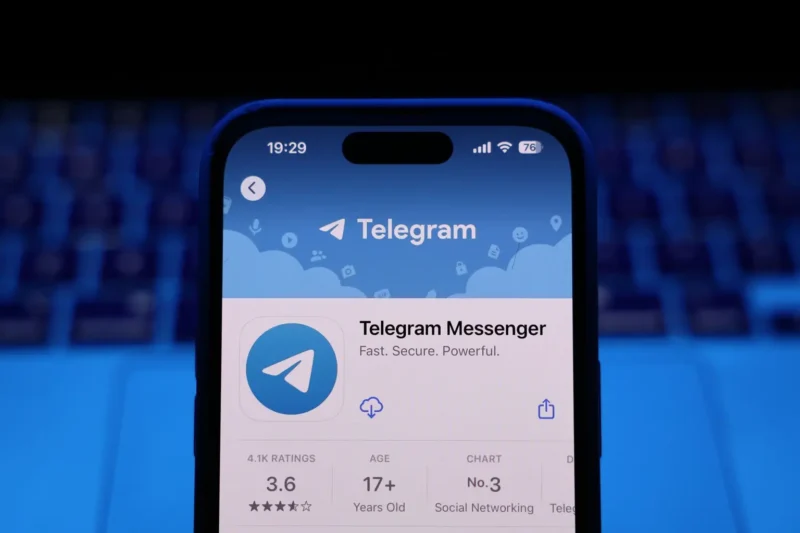
Russian authorities have begun throttling the Telegram messaging platform, escalating pressure on foreign tech services as the Kremlin promotes a tightly controlled, state-backed alternative.
Russia’s internet watchdog Roskomnadzor said on Tuesday it was introducing “phased restrictions” on Telegram, accusing the app of failing to comply with Russian laws requiring user data to be stored domestically and used to prevent what Moscow labels “criminal and terrorist activity.”
The move comes as Russia intensifies control over the digital space amid its war in Ukraine and a broader crackdown on dissent. Rights groups say the restrictions are aimed less at security and more at surveillance and information control.
Media watchdog Reporters Without Borders condemned the decision as part of a sustained effort to “strangle the circulation of information,” noting that Russia ranks near the bottom of its global press freedom index. Amnesty International described the slowdown as “censorship under the guise of protecting people’s rights.”
Telegram is one of Russia’s most widely used platforms, serving both as a private messaging service and a key channel for news, official statements and commentary. Government agencies, the Kremlin and pro-war bloggers all rely heavily on it.
Some prominent military bloggers criticized the decision, warning it could disrupt communications from the front lines and Russian-occupied territories. Others argued that slowing Telegram would undermine Russia’s own information campaigns and recruitment efforts.
At the same time, Moscow is promoting a domestic alternative called Max, which integrates messaging with payments and access to government services, giving authorities far greater oversight of user activity.
Russia has previously attempted to block Telegram, which is run by Pavel Durov, but abandoned the effort in 2020 after technical failures. Durov, who left Russia years ago, has long clashed with authorities and was forced out of the VK social network he founded.
Users across Russia reported slower speeds and lagging downloads on Telegram hours before the official announcement. Roskomnadzor has also throttled or restricted other foreign platforms, including WhatsApp, owned by Meta, and YouTube.
Critics warn that the Telegram slowdown signals a new phase in Russia’s effort to seal its internet behind state-approved platforms and narratives.
Comment
Is Signal Really Secure? What You Need to Know Before Choosing a Messaging App

Signal offers strong encryption but isn’t foolproof—here’s what to consider when choosing a secure messaging app.
When White House officials reportedly discussed sensitive Yemen attack plans on the messaging app Signal, it triggered widespread concerns about national security—and raised critical questions about whether Signal is truly secure enough for sensitive communications.
Signal has become popular among government officials, journalists, and activists due to its robust end-to-end encryption, meaning not even Signal itself can read intercepted messages. But encryption alone isn’t enough—particularly when operational security and recordkeeping requirements are involved.
Signal Fallout: Trump Defends Waltz, But Fallout Spreads Beyond One Chat Thread
As a cybersecurity professional with decades of experience, I caution that Signal isn’t the solution for top-secret communications. Instead, users must consider multiple factors beyond encryption:
First, standard messaging protocols like SMS lack encryption altogether. Carriers or authorities can easily access messages and metadata (sender, recipient, timestamps).
Apps like Apple’s iMessage and Google Messages offer end-to-end encryption but limit privacy due to metadata access, which companies could share with governments.
Popular messaging services like WhatsApp, owned by Meta, also offer cross-platform end-to-end encryption but similarly provide metadata access to their parent companies.
For greater privacy, independent apps such as Signal, Telegram, Session, and Threema offer enhanced features: disappearing messages, open-source code transparency, decentralized servers, and minimal user-data collection.
However, even secure apps have vulnerabilities—human errors. Ukrainian troops, for instance, were tricked by Russian operatives into handing over Signal access, and U.S. officials mistakenly added the wrong people into sensitive group chats.
No single messaging app provides absolute security, but by carefully weighing encryption, metadata handling, and usability, you can significantly enhance your personal privacy. Signal might not be suitable for top-secret communications, but it remains a strong choice for everyday secure messaging—provided users understand its limitations.
Comment
Undersea Cable Snaps, Disrupting Internet Across Somaliland
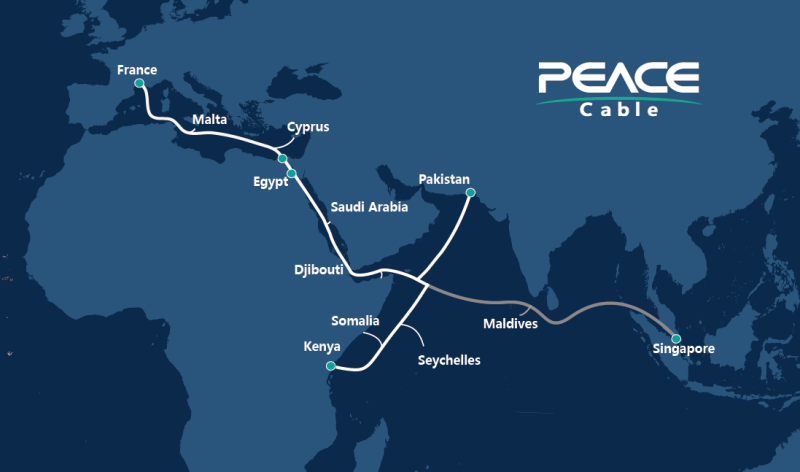
Vital PEACE Cable damage in the Red Sea puts East Africa’s connectivity on hold, with repairs expected to drag into mid-April 2025.
The recent disruption of internet services across Somaliland and parts of East Africa, due to a break in the Pakistan & East Africa Connecting Europe (PEACE) Cable in the Red Sea, underscores the fragile nature of the region’s internet infrastructure. This key undersea fibre-optic cable, which connects East Africa with Europe and Asia, experienced a significant rupture, leading to slower internet speeds and compromised streaming quality throughout the affected areas.
In an immediate response to the outage, Somaliland’s telecommunications providers rerouted traffic to backup networks, which restored services to near-normal levels. The National Communications Authority (NCA) of Somaliland has announced that complete repairs to the damaged cable are not expected to be completed until mid-April 2025. During this period, the NCA has committed to working closely with internet service providers (ISPs) to monitor service quality and address any technical issues that arise.
This incident is part of a broader pattern of vulnerabilities in Africa’s internet infrastructure, highlighted by similar disruptions in the past due to undersea cable damage in both the Red Sea and Indian Ocean. These recurring issues emphasize the critical need for enhanced redundancy measures to safeguard connectivity in the region.
The NCA has called on telecom operators to maintain transparent communication with regulators and to implement swift mitigation plans to minimize further service degradation. This proactive approach is essential in preventing future disruptions and in strengthening the resilience of internet infrastructure in Africa, ensuring reliable connectivity for its rapidly growing online population.
Communication
X Edits AI Chatbot After Election Officials Warn of Misinformation
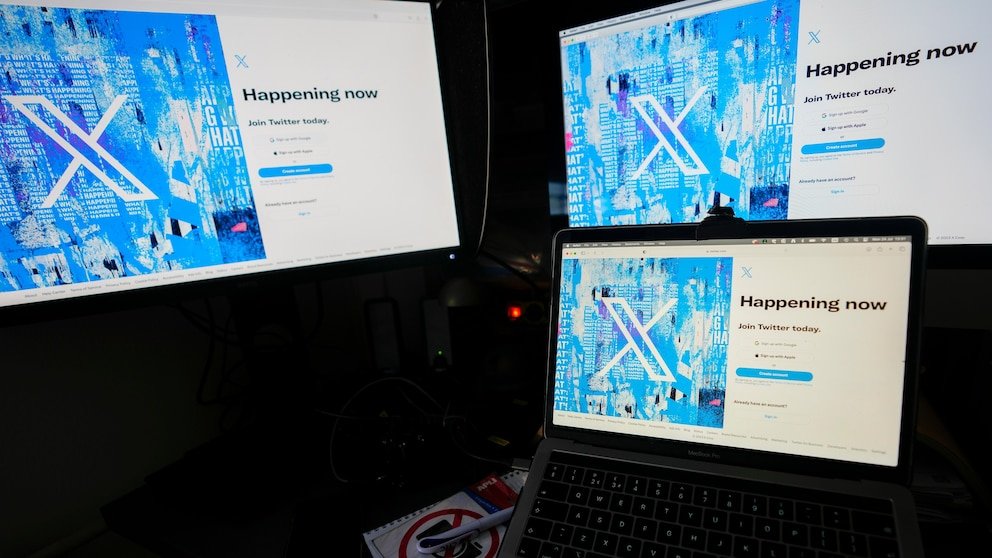
Changes to Grok AI Chatbot Follow Warnings from Secretaries of State About Election Misinformation
The social media platform X has made modifications to its AI chatbot, Grok, in response to concerns from election officials about the spread of misinformation. Secretaries of state from Michigan, Minnesota, New Mexico, Pennsylvania, and Washington had alerted Elon Musk to inaccuracies in Grok’s responses regarding state ballot deadlines, particularly following President Joe Biden’s withdrawal from the 2024 presidential race.
In response to the officials’ letter, X has adjusted Grok’s behavior to address election-related queries more responsibly. The chatbot now advises users to consult official voting resources by directing them to Vote.gov for accurate and current information. This change aims to mitigate the spread of misinformation by guiding users to reliable sources, such as CanIVote.org, recommended by the National Association of Secretaries of State.
Despite these adjustments, Grok’s ability to generate misleading AI-created images about elections remains a concern. Users have exploited the chatbot to produce and share fake images of political figures, including Vice President Kamala Harris and former President Donald Trump. These images contribute to a broader issue of misinformation and manipulation on social media platforms.
Grok, available exclusively to X’s premium subscribers, was introduced as a more unconventional AI chatbot by Elon Musk. Musk described it as a system willing to tackle “spicy questions” that other AI platforms might avoid. Since Musk’s acquisition of Twitter in 2022 and its rebranding to X, there have been growing concerns about an increase in hate speech and misinformation, alongside a reduction in content moderation staff.
The incident highlights ongoing challenges in managing misinformation on social media. The evolution of AI technology, particularly in the realm of chatbots and image generation, has raised concerns about the accuracy and reliability of information circulated on these platforms. The updates to Grok are part of a broader effort to address these issues, but experts caution that such measures may not be sufficient given the scale and impact of misinformation.
As the 2024 elections approach, the pressure is mounting on social media platforms to ensure that their systems do not contribute to the spread of false information. The changes to Grok represent a step towards addressing these concerns, but the effectiveness of these measures in preventing the dissemination of misinformation remains to be seen.
X’s updates to its AI chatbot Grok in response to election officials’ warnings are an important development in the fight against misinformation. However, ongoing vigilance and improvements are necessary to address the broader challenges posed by AI and social media in the electoral landscape.
Communication
The Celebrity ‘Blockout’: Social Media Users Push for Accountability Over Gaza Conflict

A grassroots movement pressures celebrities to take a stand on the humanitarian crisis in Gaza by blocking their social media content.
By Kasim Abdulkadir:
What is the Celebrity ‘Blockout’ Over the War in Gaza?
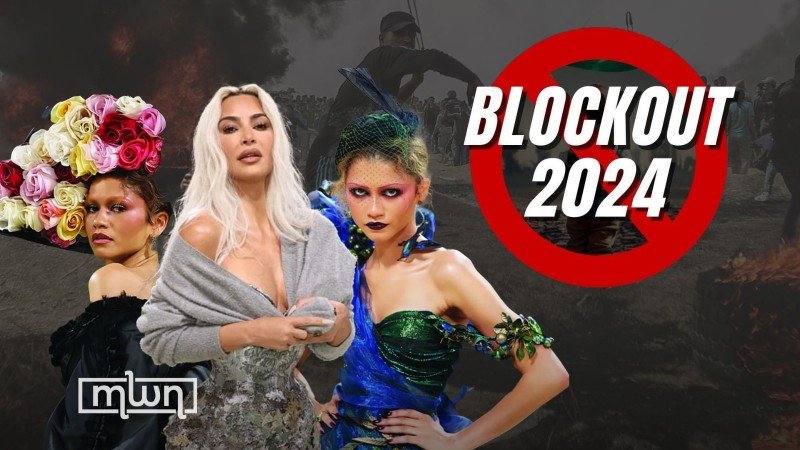
Social media users have initiated a “blockout” campaign to pressure celebrities into taking a stand on the humanitarian crisis in Gaza. The blockout involves users blocking the social media accounts of celebrities who they believe are not speaking out or doing enough against Israel’s actions in Gaza amidst its war with Hamas.
How Does the Blockout Work?
On platforms like X (formerly Twitter), TikTok, and Instagram, users can mute or block specific accounts. By blocking celebrities, users stop seeing their posts, photos, videos, and sponsored content. This action reduces the celebrities’ engagement metrics and potentially affects their income from social media activities. The goal is to divert attention away from these celebrities’ brands, thereby pressuring them to address the crisis.
Who is Being Blocked?
There isn’t a centralized list of celebrities to be blocked. Participants of the blockout choose whom to block based on personal criteria or suggestions from others. Celebrities from the U.S. and other countries are being targeted. Each social media user must block celebrities individually on each platform they use.
Origins of the Blockout
The blockout gained momentum following the recent Met Gala, a high-profile event known for its extravagant fashion displays. As images from the gala circulated online, they were juxtaposed with distressing images from Gaza, highlighting the stark contrast between the opulence of the event and the ongoing humanitarian crisis. This led to increased scrutiny of celebrities’ responses, or lack thereof, to the situation in Gaza.
Will the Blockout Be Effective?
The long-term effectiveness of the blockout remains uncertain. According to Beth Fossen, an assistant professor of marketing at Indiana University, the impact may vary depending on the celebrity’s brand and public persona. Celebrities known for their humanitarian efforts may face more significant backlash for their silence compared to those whose fame is primarily based on their talent or other attributes.
Blockout Backlash
The blockout has faced criticism from some quarters. Detractors argue that focusing on celebrities detracts from the real issues on the ground in Gaza. There are also debates about what constitutes adequate action or statements from celebrities, adding complexity to the movement’s goals.
In conclusion, the celebrity blockout is a digital protest aimed at leveraging social media dynamics to push celebrities into taking a public stand on the Gaza conflict. While its long-term effectiveness is yet to be determined, the movement highlights the growing expectation for public figures to engage with pressing global issues. The blockout also reflects broader tensions about how social media influences activism and accountability in the digital age.
Communication
Deciphering Communication: Exploring the Depths of Discourse Analysis
Unveiling the Language Dynamics That Shape Human Interaction
BY GUEST ESSAY:
Curious about discourse analysis? Dive deep into the nuances of language and communication dynamics that shape our interactions.
In the rich tapestry of human communication lies a profound understanding of language dynamics – a realm explored through the lens of discourse analysis. From casual conversations to political speeches, discourse analysis unveils the intricate layers of language that shape our interactions, beliefs, and societal structures. Let us embark on a journey to unravel the mysteries of discourse analysis and explore its profound implications for understanding human behavior and communication dynamics.
Unveiling Discourse Analysis:
Discourse analysis is a multidisciplinary approach that examines the use of language in social contexts, focusing on the structure, patterns, and functions of communication. Rooted in linguistics, sociology, anthropology, and communication studies, discourse analysis seeks to uncover the underlying meanings, power dynamics, and social constructions embedded within spoken and written texts.
Exploring Language Dynamics:
At its core, discourse analysis delves into the intricate interplay between language, power, and identity. By examining the choice of words, rhetorical strategies, and communicative patterns, discourse analysts seek to uncover how language shapes our perceptions, beliefs, and social realities. From analyzing political speeches to dissecting media narratives, discourse analysis sheds light on the ways in which language influences social norms, ideologies, and power structures.
Key Concepts in Discourse Analysis:
- Text and Context: Discourse analysts examine texts within their broader social and cultural contexts, recognizing the influence of social dynamics, power relations, and historical discourses on language use.
- Power and Ideology: Language is inherently imbued with power, reflecting and reinforcing existing social hierarchies, ideologies, and inequalities. Discourse analysis exposes how language can be wielded to shape perceptions, marginalize certain groups, and maintain hegemonic structures.
- Discursive Strategies: From framing and metaphor to intertextuality and silence, discourse analysis identifies the various strategies through which language is employed to construct meaning, negotiate identities, and shape social realities.
- Identity and Representation: Language plays a crucial role in the construction and negotiation of individual and collective identities. Discourse analysis explores how language reflects and shapes identities based on factors such as gender, race, class, and nationality.
Applications of Discourse Analysis:
Discourse analysis finds applications across a diverse range of fields, including media studies, political science, education, psychology, and cultural studies. By uncovering the underlying meanings and power dynamics embedded within language, discourse analysis offers valuable insights into social phenomena, ideological shifts, and communicative practices.
Conclusion:
As we navigate the complexities of human communication, discourse analysis serves as a powerful tool for unraveling the intricacies of language and understanding the dynamics that shape our interactions, beliefs, and social structures. By delving into the nuances of language use, discourse analysts illuminate the ways in which language reflects and reinforces social realities, offering invaluable insights into the complexities of the human experience.
-

 Minnesota2 months ago
Minnesota2 months agoFraud Allegations Close In on Somalia’s Top Diplomats
-

 Middle East2 months ago
Middle East2 months agoTurkey’s Syria Radar Plan Triggers Israeli Red Lines
-

 Editor's Pick2 months ago
Editor's Pick2 months agoWhy India Is Poised to Become the Next Major Power to Recognize Somaliland
-

 ASSESSMENTS2 months ago
ASSESSMENTS2 months agoSomalia’s Risky Pact with Pakistan Sparks Regional Alarm
-

 Analysis2 months ago
Analysis2 months agoTurkey’s Expanding Footprint in Somalia Draws Parliamentary Scrutiny
-

 Analysis2 months ago
Analysis2 months agoRED SEA SHOCKER: TURKEY’S PROXY STATE RISES—AND ISRAEL IS WATCHING
-

 Somaliland1 month ago
Somaliland1 month agoF-35s Over Hargeisa: The Night Somaliland’s Sovereignty Went Supersonic
-

 Somalia2 months ago
Somalia2 months agoIs Somalia’s Oil the Price of Loyalty to Turkey? MP Blows Whistle on Explosive Oil Deal


